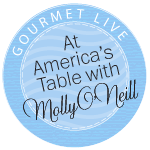
Food, I loved you first in a dark cellar pantry when I was 5 years old and you’d assumed the form of brown sugar. Even then, you were ancient, weren’t you, my Mephistopheles? Morphed for that moment inside a sunny yellow box, you emanated the promise that has driven men to war and women to cook.
“Eat me and you will be happy,” you said. And I did.
I was a lonely little girl, barely able to spell out the letters on the box—D-O-M-I-N-O—as I ripped it open, grabbed you between two fingers and pushed you into my mouth.
“What happened to this box of brown sugar?” asked my mother. “It’s mangled and half gone.” Silence.
“Maybe we have mice!” she said. Wide-eyed wonder, followed by a lifelong terror of rodents, particularly the one who just might live within.
I tried to run away. The 50-yard dash, the 100-yard dash, the 440. I weighed myself after every race, and every time I’d lost a pound, I was free! Life could begin again! But every time you found me again, generally that same night, in some purloined, sugary form. When I was young, I could never say no to you, my Mephistopheles.
I made my first confession in the United Church of Weight Watchers when I was 15: Five feet ten inches, 147 pounds, I was 7 pounds above My Goal in the only faith in which achieving more than normal is considered less than good. Like most religious dietary law, the UCWW guaranteed enlightenment (a.k.a. My Goal) to those who lived within its parameters.
The dietary code also made friends of strangers. Gathered on folding chairs in a church basement, we were acolytes in your thrall, united in dietary fellowship, each polishing the gem of resistance: cooking. There was a recipe-swap ambience to the meetings—toothsome creations fashioned within the bounds of the food plan were greeted with the same applause as lost pounds at the weekly weigh-in. I was eager to test-drive the recipes, and doing so meant learning to cook.
“If you want pumpkin custard made with fake sugar and sorbet made from diet chocolate soda, it’s fine by me,” said my mother, “but you’re going to have to make it yourself.”
Once I put my diligence and imagination into inventing recipes instead of sneaking sweets, applause and approval quickly followed. My ricotta-cheese-and-egg-white flan was a particular favorite, at home and with the church-basement crowd. Soon, I was applying the fine-motor skills required for slyly hollowing out chocolates to knife skills instead. The perfect 1/8th-inch dice, the 1/16th-inch mince, the julienne.
“Where did all the carrots go?” asked my mother.
“I’m making mirepoix.”
You must have suffered so, my Mephistopheles, watching as I changed water and bones to broth, sugar to caramel, egg whites to meringue. There is no greater power than the power to transform ingredients into dinner. You’d rather have people grab fast food, protein powder, and store-bought diet food than glean the sense of mastery that comes with turning the raw into the cooked.
But you were patient. You gave me space—a decade, and then another. Back then, it felt like a gift. Today, I know that you had no choice: Food, you have no power when you are loved, when you are celebrated, and especially when you are shared. You work in consort with bad days and internal demons. And, being ancient, you well know that opportunity comes to those who wait.
So you waited for the curdled custard, the fallen soufflé. You waited for the boy who didn’t call, the impossible assignment, the times when life became so dense and demanding that meals were consumed on the run. When the parent died and the baby was born too soon, you stood in the waiting room, biding your time, didn’t you, my Mephistopheles?
You came back as pasta, the crown prince of the low-fat empire. I bowed. I twirled my fork. I scraped Parmesan islands from rivers of olive oil. Self-doubt settled in, the wage of age, like a gray veil full of empty little pockets. You filled each of them, providing insulation, and then more insulation, then soft little pillows, and eiderdown bolsters.
I woke up fat about 10 years later. There you were, standing by the front door in jeans and a black leather jacket, sucking on a Turkish cigarette, smirking. You looked like a cross between Elvis and Methuselah. I went back to church.
How you laughed when I carried the Weight Watchers scale back to the kitchen. “You’re kidding, right? That little plastic thing?” Night after night, you sat in my kitchen, strumming your guitar and howling. “I don’t care if it rains or freezes, long as I got my plastic Jesus sitting on the counter of my kitch-eeeen.”
Of course, you were right. The UCWW had been a swift and certain path when my enlightenment was a mere 7 pounds away. Three decades later, nearly 50 pounds stood between me and My Goal, and it was soon apparent that the UCWW could deliver neither quick nor dramatic relief.
Now I was in crisis. I needed rules! Discipline! Judgment!
Overeaters Anonymous HOW (“Honesty, Open-mindedness, and Willingness”), a sect of the original OA, offered just that. What the Amish are to the Mennonites and the Hasidim are to Orthodox Jews, the HOW group is to the original 12-step food program. Like other breakaway groups, OA HOW-ers speak their own language. Food is “a substance,” and in some quarters must not even be named: “I lost my abstinence on a round, brick-oven-fired dough substance, topped with a red vegetable substance and melted dairy,” one fallen member reported.
Adherents are also careful to distinguish their appearance. Rather than growing curling peyos like the Hasidim, OA HOW-ers carry their food in Tupperware wherever they go. A traffic delay or even being taken hostage by terrorists is, in this creed, no excuse to miss a weighed and sponsor-approved meal—sponsors being the elders of the sect, who lead new supplicants through a daily practice that includes the “turning over” (telling another) of one’s every morsel before the day begins, as well as “quiet time” (meditation), self-reflection, and confession of sins, dubbed “step work” or “step journaling.”
The OA HOW “food plan” was the original UCWW, minus a couple of ounces of protein and plus a prohibition against flour, sugar, and wheat. And unlike in my church-basement days of old, here the creative possibilities discovered within the portions of approved food were not greeted with enthusiasm. When I reported the happy result of combining a vegetable and broth substance in a blender to make a fabulous soup, Sponsor put her hands over her ears and shook her head violently.
“That is mixing,” she said. “You are clearly not willing to surrender your obsession with taste. Food is fuel. Do you worry about how the gas you put in your car tastes?”
I saw through the 90-day commitment I’d made to myself. For the duration, I ate every meal alone, struggled to balance my job with the prescribed three to four hours of daily observance (calls, meetings, reading, step work), shut down my social life, and spent my quiet time weighing and measuring the gasoline question. I lost 31 pounds. I was not, however, enlightened. I was half dead.
Eating is human, an instinct as central as breathing. Anyone who has gulped an ocean breeze knows that breathing is more than an oxygen-delivery system. It is a celebration of life, a prayer, a moment-by-moment decision to share something held in common, something that keeps us alive.
Appetite is more of the same. Fear of hunger spurred human settlement and civilization; it also explains politics and social mores, competition and collaboration. Fear of hunger, at its most extreme, can rationalize inhumanity and spur mere mortals to superhuman accomplishment. Fear of food, on the other hand, is a refusal to share the quest for security, the celebration of having achieved it, and the possibility of moving beyond elemental satisfaction to create art and delight and a better world—the fullest expression of the human spirit.
Dedicating one’s life to controlling and demonizing appetite is an exercise in self-loathing. And that is just the sort of down trend, the bad day you live for, isn’t it, my Mephistopheles? That soft opening of self-doubt is vulnerable to your greatest weapon—the wedge you drive between human instincts and the rational mind. Once the separation is achieved, you move in and incite war.
You came back on the 71st day of my solitary confinement. Through the iron wall of my self-imposed cell, I felt your valence as you waited in the dark cellar hallway. I caught the smell of your transfigurations—the warm lavender shortbread cookies, the steamy latte, the hot brick-oven bread, the spaghetti alla carbonara.
It was gale force, your pull—as scary as a phantom limb hopping around in search of its rightful body. I could almost feel my recently deflated adipose tissue singing a siren’s song of its own, predestined to seek its cells’ lost substance. I began to hum Gloria Gaynor just to drown out the noise. And so you’re back, from outer space. I just walked in to find you here with that sad look upon your face…
And then the miracle happened. Instead of tightening my resolve, I loosened my grip. Instead of railing and castigating, I said: Great! Just make the best carbonara possible. You can’t do it today, of course, you need to get those very rich eggs from the farmer upstate, that pancetta your friend is making in Virginia, that grana Parmesan. You should invite a few people over…
A week had passed by the time I’d gathered the ingredients and the guests, and in that time, the compulsion born of a futile surrender was transformed into a quest for excellence and the excitement of sharing it. I no longer wanted more than a small portion. I savored every bite.
Diets and programs can, I realized, be paths to enlightenment. But that state of peace is a fragile truce and a daily accommodation to the shifting demands of life, personal priorities, and metabolism. The carbs that served me well when I ran track and swam competitively are not my friend 30 years later. I’ve developed a sensitivity to sugar and dietary fat. Eating vegetables and protein and walking an hour a day works best for me at this point in my life.
But despite what you would like me to believe, my Mephistopheles, carbs, cookies, and bacon are not so many apples in Eden. The pleasure I take in them may make me fear banishment, may make compulsion seem inevitable. But it’s nothing that a brisk walk, a nice chat, a good laugh, a good deed, or a great dinner party can’t alleviate. When in doubt, make dinner, not war.
I know that it’s changed between us, my old friend. But stick around. Your same old songs return to haunt me, warn me. I take them seriously. I celebrate, I create, I cook. I hardly ever hum your tune anymore.
Molly O’Neill is the author of seven books, including Mostly True: A Memoir of Family, Food, and Baseball and One Big Table: A Portrait of American Cooking. Her ebook, This American Burger, was recently published by New Word City. Her most recent contribution to Gourmet Live was “Baking for a Better World.”

